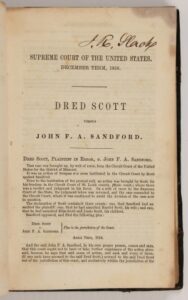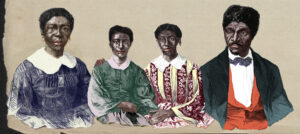
Two Men on Different Sides of History
This text presents excerpts from Chief Justice Roger Taney’s majority opinion and Justice John McLean’s dissenting opinion in Dred Scott v. Sanford, a Supreme Court case decided in 1857. The Dred Scott verdict remains one of the most controversial Supreme Court decisions in American history. In the majority opinion, Taney argued that when the Declaration of Independence was written, the statement “all men are created equal,” applied only to the white race. According to Taney, American ideas about natural rights excluded black people because they were brought to the country as slaves.
By contrast, McLean believed that American history told a much different story. He observed that both free and slave states had previously recognized people of color as citizens. He also observed that in newly admitted states such as Louisiana and Florida, people of color had been automatically acknowledged as citizens “without being naturalized under the acts of Congress,” suggesting that the naturalization process was not required for Dred Scott to be considered free. Essentially, McLean was alluding to John Locke’s natural rights claim that all men are created equal under God, and no one is above another.
It is thought-provoking how two men from the same time period, with similar levels of education and historical ties to Dickinson College, could differ so fundamentally in their opinions on human rights. When I first read these excerpts, it seemed that the majority opinion sought to maintain tradition, which for me raised the question of when we must break with tradition. Yet when I took a closer look at McLean’s statements, it occurred to me that he was also arguing in favor of tradition. He employed instances of equality in the country’s history to counter what he considered to be Taney’s falsely constructed tradition of racial hierarchy. Clearly these two men had very different interpretations of the American past. How is one to decide which view was correct? One thing is clear: majorities cannot always rule on such critical matters.
By: Charlotte Goodman, June 2021
